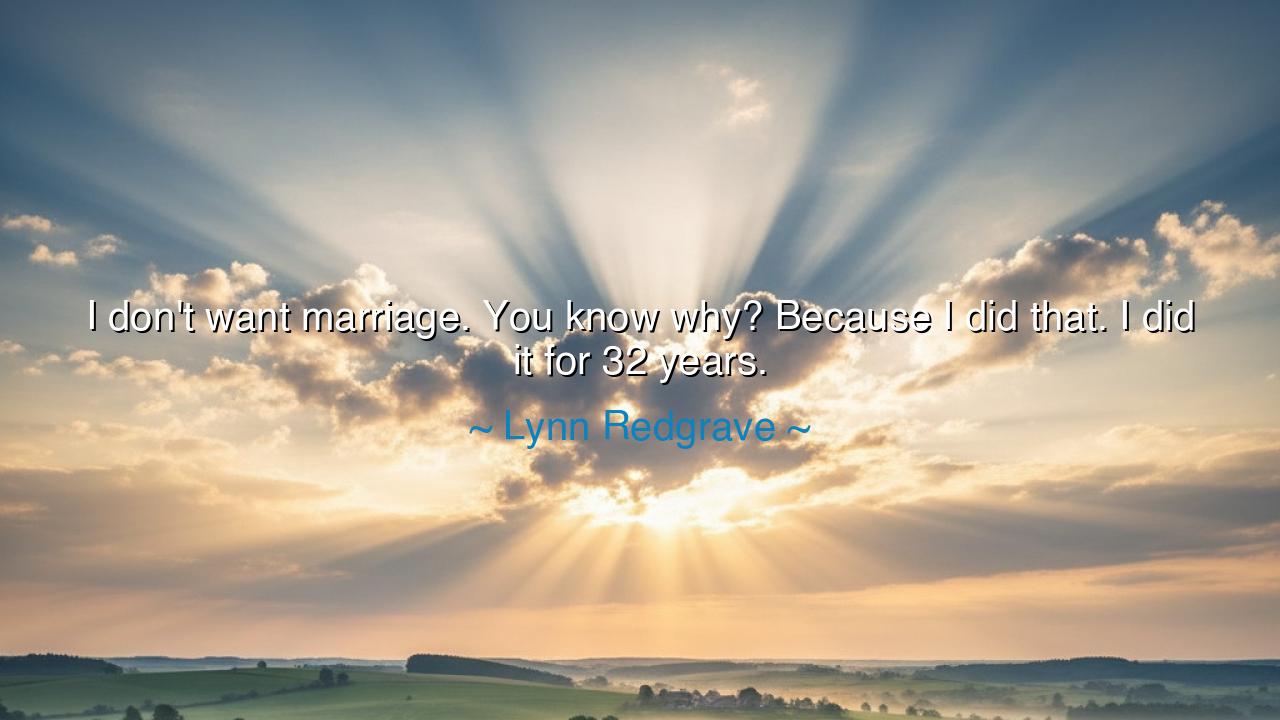
I don't want marriage. You know why? Because I did that. I did it






In the reflective and candid words of Lynn Redgrave, a woman of strength, artistry, and endurance, we hear the weary yet wise voice of one who has journeyed deeply through love and loss: “I don’t want marriage. You know why? Because I did that. I did it for 32 years.” These are not words of bitterness, but of understanding—an echo of one who has lived within the sacred contract of marriage long enough to see its beauty and its burden. Redgrave’s statement carries the tone of one who has walked through the fires of companionship, sacrifice, and heartbreak, and emerged with a truth both personal and universal: that love is not always bound to the structure that once held it.
The meaning of this quote lies not in rejection, but in release. Redgrave’s words do not scorn marriage—they acknowledge its weight. After thirty-two years, she had given herself to the demands of partnership, the compromises of union, the invisible work of devotion. To say, “I did that,” is to say, I have learned what it gives and what it takes. In her voice we hear not the naivety of romance, but the clarity of experience. Marriage, for her, was not a failure—it was a chapter complete. Having lived it, she no longer sought to repeat it, but to live beyond it, in the freedom of selfhood reclaimed.
The origin of these words is rooted in Redgrave’s own life—a life marked by both achievement and pain. Born into one of England’s most renowned acting families, she carried the legacy of artistry with grace and courage. Her marriage to John Clark lasted over three decades, a union that brought children, companionship, and creative collaboration—but also, in its twilight, betrayal and dissolution. When she spoke these words, it was not as a cynic, but as a survivor. Having endured the unraveling of something once sacred, she had come to a place of peace with solitude. In her voice there is both the fatigue of one who has labored long in love and the strength of one who has chosen self-reliance after sorrow.
Throughout history, many have echoed this same realization—that love, though divine, can also be consuming, and that the soul must sometimes step away to breathe. Consider Eleanor of Aquitaine, queen, mother, and power in her own right. Twice married—first to the King of France, then to the King of England—she lived within the confines of royal duty, bound by alliances rather than affection. When her second marriage collapsed, she found her greatest peace not as a wife, but as a ruler in her own domain. Like Redgrave, she had done that—she had lived the long trial of marriage and emerged with a clearer sense of herself. Both women, in their different ages, remind us that fulfillment is not always found in coupling, but often in reclaiming the self after the storm.
Yet, Redgrave’s tone is not one of despair—it is one of acceptance. She speaks with the calm of one who knows that love is not confined to marriage, nor life to companionship. Her words honor the work of the heart that marriage demands, while also acknowledging the cost of that labor. To say “I don’t want marriage” is, in her case, not a denial of love, but a declaration of peace. It is the wisdom of a soul that no longer seeks to repeat what it has already mastered. This is the maturity that comes only after living fully—the serenity that follows endurance.
There is also in her words a broader truth for all who listen. The world often tells us that love must be eternal to be valid, that commitment must bind us until death to be meaningful. But Redgrave’s wisdom challenges that myth. Love, she teaches, is sacred not because it lasts forever, but because it teaches. Marriage is not merely a destination; it is a pilgrimage through which the soul learns patience, forgiveness, and courage. When that pilgrimage ends, the traveler is changed. To say “I did that” is to say, I have learned what love required of me—and now, I seek peace in my own company.
Therefore, O seeker of understanding, take this lesson to heart: do not measure the worth of love by its duration, but by its depth. When something ends, let it end with grace. When a season closes, do not cling to the husk of what was, but honor it and move forward into what is. Marriage, like all sacred labors, may one day be completed—not because it failed, but because it fulfilled its purpose. When that day comes, may you have the courage, as Lynn Redgrave did, to speak without regret, to live without longing, and to cherish both the years of union and the peace of solitude.
For in the end, her words remind us that there is dignity in having done, just as there is hope in what remains to be. The heart that has known long love and chosen freedom afterward is not weary—it is wise. “I did that,” she says, and in that quiet declaration lies the triumph of experience: the knowledge that love, once lived truly, remains forever part of the soul, even when the vows have faded into memory.






AAdministratorAdministrator
Welcome, honored guests. Please leave a comment, we will respond soon